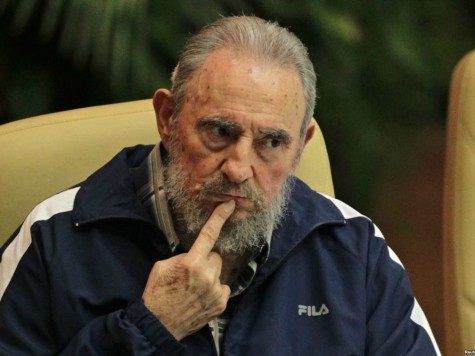In a tell-all autobiography to be released in English this year, Fidel Castro’s former bodyguard asserts that, while head of state, the Cuban dictator ran cocaine and marijuana trafficking operations “like a godfather.” The body guard also claims Castro executed some of his top officers to prevent further international attention for bolstering violent drug cartels.
Juan Reinaldo Sanchez worked as Castro’s bodyguard for 17 years before being imprisoned for trying to retire in 1994. As the New York Post notes, he only arrived in Texas after 10 attempts to escape the island, and is now releasing an English-language version of his book, The Double Life of Fidel Castro, at a time when many in the White House have claimed that the Cuban regime should no longer be treated as a rogue entity.
In an excerpt published by the New York Post, Sanchez writes that he listened in on a conversation between Castro and José Abrantes, once the nation’s minister of the Interior, in which Castro orchestrated a deal with a drug trafficker to keep his business: the man would keep working with the Cuban government if he could, for a $75,000 purchase of a vacation near Havana with his family.
“Very simply, a huge drug-trafficking transaction was being carried out at the highest echelons of the state,” writes Sanchez, highlighting this as the moment he became disillusioned with the Revolution:
I realized that the man for whom I had long sacrificed my life, the Líder whom I worshipped like a god and who counted more in my eyes than my own family, was caught up in cocaine trafficking to such an extent that he was directing illegal operations like a real godfather.
Sanchez notes that it was strategically beneficial to Castro to work in the drug trade because “it corrupted and destabilized American society.”
Not long after this conversation, Sanchez writes, American officials began investigating possible links between Castro and drug trafficking. Rather than let the situation continue and risk discovery, Castro sacrificed two of his highest-ranking men– Abrantes and General Arnaldo Ochoa, who made his name fighting for communism in Africa with Cuban troops. Abrantes died in jail of “suspicious” circumstances, Sanchez relates. Ochoa was executed.
“Castro made us watch it. That’s what the Comandante was capable of to keep his power: not just of killing but also of humiliating and reducing to nothing men who had served him devotedly,” writes Sanchez, describing the execution video in detail.
The New York Times wrote at the time of the testimony of those at the Ochoa trial, 1989, their words matching what Sanchez heard:
Cuban military officers testified that they sold diamonds, fish, sugar, rum and electronic equipment on the black market in Angola to obtain hard currency for Cuba. One witness, Lieut. Col. Arnaldo Morejon Plat, testified that General Ochoa had told him that such sales “had been authorized” by the Castro brothers.
Even then, experts in Miami stated that Ochoa may have been running a drug operation, but that it was secondary to “an official operation sanctioned by Fidel and Raul Castro.”
Sanchez’s story has not changed since he released his book in Spanish last year. Then, he told media outlet La Información that Castro “trafficked in drugs, arms, and diamonds.” He said, “I saw that he was capable of killing a man close to him, General Ochoa, who he executed, and thought of what could happen to me.”
Castro’s ties to violent drug trafficking are once again relevant in light of President Obama’s announcement in December that the United States would make major concessions to the Raúl Castro regime, in exchange for, as Castro himself put it, “nothing at all.” The White House has taken Cuba off the State Department’s list of State Sponsors of Terrorism, on which Cuba had been since 1983 for its ties to a number of terrorist groups, most prominently the Revolutionary Armed Forces of Colombia (FARC). Cuba has not changed its attitude towards the FARC since it was placed on the terror watch list, and it currently provides safe harbor from the Colombian government to its highest-ranking leaders. The President of Colombia has spent months in dialogue with FARC leaders in Havana attempting to come to a peaceful resolution of violence, though talks have been abandoned since the FARC attacked a base and killed eleven Colombian soldiers in April.
In an interview with Colombia’s El Espectador in April, Sanchez confirmed that Cuba not only provided safe harbor to FARC terrorists, but helped train them to fight Colombian soldiers. “I saw guerrillas in Punto Cero de Guanabo [a terrorist training camp east of Havana],” he told the newspaper. “Castro spoke with them. To the FARC and these leftist movements in Latin America, Fidel supported them with arms and money because this was the way he thought possible to amass political power.”
Sanchez added that Castro also did significant drug trafficking with the cartel run by notorious Colombian drug kingpin Pablo Escobar, and that he also commanded Ochoa to work with Escobar before he was executed for doing just that.

COMMENTS
Please let us know if you're having issues with commenting.